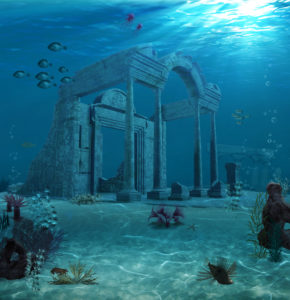 The first DC Comics Aquaman film, scheduled for a December 21 release, focuses on its titular hero and his role in the battle for the Atlantean throne. Many people are familiar with legends about the mythical kingdom of Atlantis. It’s natural to assume that the DC Universe version was inspired by older legends, but how do the two universes compare? Answering that question begins with an examination of both Plato’s accounts and Aquaman’s comic book origins.
The first DC Comics Aquaman film, scheduled for a December 21 release, focuses on its titular hero and his role in the battle for the Atlantean throne. Many people are familiar with legends about the mythical kingdom of Atlantis. It’s natural to assume that the DC Universe version was inspired by older legends, but how do the two universes compare? Answering that question begins with an examination of both Plato’s accounts and Aquaman’s comic book origins.
Plato Spins a Spectacular Tale
The Ancient History Encyclopedia explains that Plato composed two dialogues, “Timaeus” and “Critias,” in which the Greek statesman Solon retells the mythical stories of Atlantis heard during his Egyptian travels. This mythical empire was located past the “Pillars of Hercules,” an ancient term for the Strait of Gibraltar, and supposedly existed from Italy to Egypt about 9,000 years before Plato’s writings in 360 B.C.E. Solon also describes it as concentric circles of land and water bisected by a canal that connected them all. Moreover, he adds that its demigod citizens prospered from its abundant resources, technological prowess, and conquest of other lands.
The Search for Plato’s Atlantis
According to Plato’s dialogues, Atlantis’s mythical rulers and people began lusting for power and material wealth. Meanwhile, the gods watched in horror and determined that punishment was required. Once the Athenians defeated the empire, earthquakes and flooding caused it to sink into the ocean.
Those speculating about Atlantis’s historical location name several possibilities, including the Aegean island of Thera or Minoan Crete. Mystics Edgar Cayce and Helena Blavatsky presented their theories, and Ignatius L. Donnelly’s 1882 book “Atlantis: The Antediluvian World” insisted that it contained the Biblical Garden of Eden and was destroyed by the Genesis flood. National Geographic writer Willie Drye discloses that modern interest in Atlantis usually focuses on the “lost continent theory,” with proposed locations in the Atlantic Ocean, Antarctica, Mediterranean, or Caribbean regions.
A Fabled Kingdom in DC Comics
The Encyclopedia Britannica mentions that DC Comics writer Mort Weisinger created Aquaman in 1941. To support his storylines, Weisinger likely collaborated with illustrator Paul Norris to create the DC version of Atlantis. The fan-written DC Universe Wiki offers details about this undersea continent, located in the north Atlantic Ocean and populated by people advanced in both science and magical arts.
Aquaman’s Atlantis sunk to the bottom of the sea 9,600 years before the present era, thanks to flooding and earthquakes caused by the impact of a skull-shaped meteor. Some inhabitants remained in the city-state of Poseidonis, which was protected by a large dome. Others migrated to Tritonis, where their scientists devised methods to transform them into aquatic amphibious humanoids capable of surviving underwater. As a result, they added superhuman strength to their collection of fantastic abilities.
How the Plato and DC Versions Compare
A quick evaluation of both Plato’s descriptions and the DC Universe creations of Atlantis yields some fascinating findings:
- Each land was home to an advanced civilization.
- Both kingdoms sunk into the ocean from cataclysmic events.
- Their citizens possessed superhuman capabilities.
Many DC Atlanteans survived its sinking, gaining additional superhuman traits to survive. Most of Plato’s Atlanteans were presumed to have died, but some modern Atlantis enthusiasts speculate that they escaped in spaceships or fled to other lands and interbred with their inhabitants.
Human Curiosity and Storytelling
Oscar Wilde stated in an 1889 essay that “Life imitates Art far more than Art imitates Life.” Does DC Comics’ Atlantis imitate or derive from earlier narratives? Plato’s intent may have been to warn against greed, excessive pride, and selfishness, while Aquaman’s compatriots demonstrate adaptability in the face of tragedy and change. When the 2018 film debuts, it’s very likely that some will watch for parallels between DC’s creations and the original tales.

